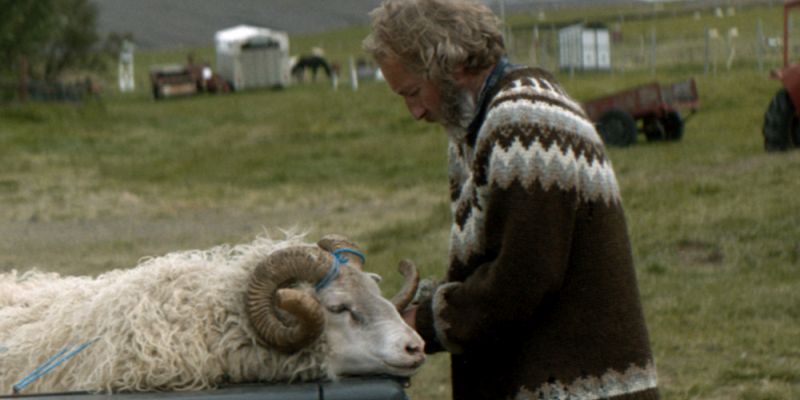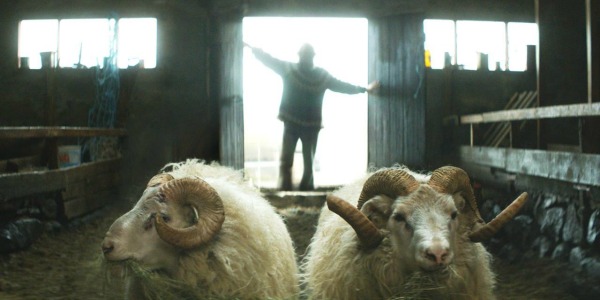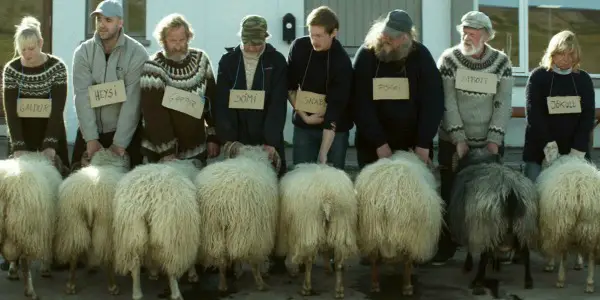RAMS: Far More Than A Quirky Sheep-Farming Comedy

Alistair is a 25 year old writer based in Cambridge.…
Iceland is slowly becoming one of the planet’s leading cinematic nations, with many directors realising that the country’s desolate landscape is the perfect fit for sci-fi. Christopher Nolan and Ridley Scott have both shot there recently, whereas the upcoming Rogue One: A Star Wars Story was filming there last autumn.
With Iceland’s tiny population, this means that the nation’s few film crews are being overlooked, as directors queue up by the dozen to utilise the scenery – something which should prove detrimental to Iceland’s own filmmakers.
Distinctively Icelandic
Rams, the second feature from writer/director Grímur Hákonarson, is proof that Iceland is continuing to have a strong film heritage, unbeknownst to the wider world; it is a quirky oddity, but with enough heart to ensure it achieves widespread cult status outside of its homeland. It could easily do for Icelandic cinema what Bjork and Sigur Ros have done for Icelandic music. Like the aforementioned artists, Rams is a film whose deadpan eccentricities don’t ever come across as weird. It grounds itself in a universally relatable story about family that will remain touching after all the oddball laughs have dissipated.
Theodór Júlíusson and Sigurður Sigurjónsson star as neighbouring brothers Kiddi and Gummi, both of whom are sheep farmers revered in the local community, constantly winning prizes for the high quality of their respective herds. Yet for the past four decades, the two have refused to speak to each other, for reasons never specified – they communicate solely through letters exchanged via a sheepdog.

When one of their flocks is diagnosed with having Scrapie (a fatal disease that affects the nervous system of both sheep and goats), the authorities come to town to kill all the sheep so the disease doesn’t become widespread across the local community. This leads the brothers to finally communicate to protect the healthy sheep they are in care of. As scenarios go, the above narrative sounds like a product of the most austere arthouse, devoid of laughs or any engaging dramatic interest. Yet its dry tone fails to conceal its warm heart; many viewers have claimed this is clearly a deadpan comedy, but the laughs are few and far between, unless the sight of geriatric male nudity is considered hysterical.
Rams may not be fully comic, but it is eccentric – a factor which is likely the result of why many have found it easier to categorise it as a comedy instead of a drama. It is a film with arch qualities, but one that deserves to be taken fully seriously nonetheless. In fact, it is surprising how moving it becomes as it closes in on its final act, considering how much the pre-release marketing relies on the audience being tricked into thinking this is nothing more than a quirky deadpan comedy.
More than the sum of its quirks
The characters may be defined by their refusal to accept change, be it in familial relations or integrating into the world around them, but this is a character study that affords both brothers’ rich growth up until its effective final moments. I laughed a minimal amount of times, yet was enraptured throughout; it is a classic story of sibling rivalry transported to a new setting and told with a fresh deadpan style.

To call Rams quirky is to do it a disservice, suggesting that its arch to the extent of being emotionless – I suspect viewers who find it to be this way are reacting to the regionally-specific tone for the first time, as there is very little here that appears to be intentionally humorous. Audiences (including this writer) aren’t attuned to Icelandic cinema’s deadpan tone, but it is clear that making viewers laugh is a secondary priority here; anybody who has seen Scandinavian film and TV will already be attuned to this curious kind of dramatic deadpan – taking absurd elements and making them comically social-realist. Its a technique Swedish director Roy Andersson uses frequently; existential despair disguised as surreal comedy.
Rams is thematically rich beyond its familial premise, with undercurrents about how the brothers’ lives have been affected by spending their time divorced from both each other and modern life outside of their respective farms. It is to the credit of the writer/director that no thematic element feels either forced or on-the-nose; in fact, they all appear accidental, as if any audience member who sees them has just stumbled on to a narrative coincidence.
For example, at one point a character asks one of the brothers about his non-existent romantic life and desire to start a family. The question is shrugged off, even though elsewhere in the film we see him forcing his prized cattle to breed; all his sexual energy and potential parental instincts channeled into the one thing keeping him away from the society that is equally demanding he breed and start a family. This is a parallel never called attention to, as well as being one of the many scenes that prove the film’s richness lies not in its comedy, but in its compelling character studies.
Conclusion
Rams isn’t the film that is going to definitively put Iceland on the world cinema map, but it is the boldest invitation to international audiences yet about the distinctive tone of their cinema. Mixing dry comedy, emotional resonance and even some vague mythic elements, Rams will never be a crossover success. But it will be a gateway drug for cinephiles wanting to see more movies from the land of fire and ice.
What are the best Icelandic films?
Rams is out now on VOD and select theatres in the UK and US. All international release dates are here.
https://www.youtube.com/watch?v=PWVmUVAdi5Y
Does content like this matter to you?
Become a Member and support film journalism. Unlock access to all of Film Inquiry`s great articles. Join a community of like-minded readers who are passionate about cinema - get access to our private members Network, give back to independent filmmakers, and more.
Alistair is a 25 year old writer based in Cambridge. He has been writing about film since the start of 2014, and in addition to Film Inquiry, regularly contributes to Gay Essential and The Digital Fix, with additional bylines in Film Stories, the BFI and Vague Visages. Because of his work for Film Inquiry, he is a recognised member of GALECA, the Gay & Lesbian Entertainment Critics' Association.













